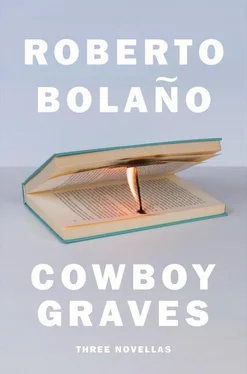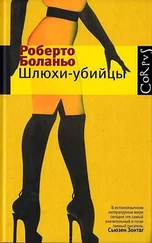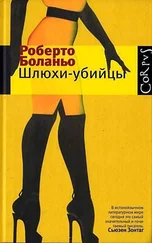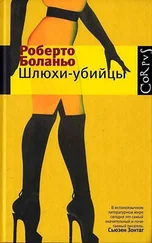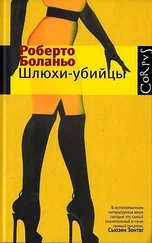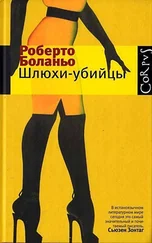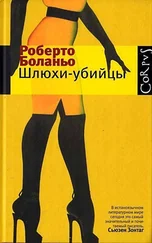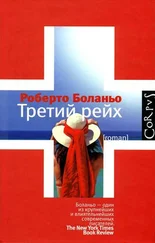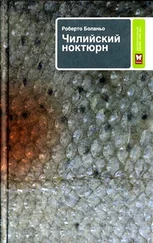I didn’t see it that way, and before I left I took my Caborca knife from my backpack and put it in my pocket. This was a working-class neighborhood of single-story houses with back and front yards, stretching endlessly along the highway south from Santiago. On the other side of the highway rose a new shantytown with narrow unpaved streets, linked to the neighborhood and its shops via a few very high pedestrian walkways. Along both sides of the highway were many vacant lots.
There was no one outside, but I knew that the painter’s neighbors were Socialists because people came into their yards at night to talk and we’d spoken once. So I crossed the street and knocked on their door. I wasn’t a Communist or a Socialist but it didn’t seem like the kind of day to be choosy about your comrades. The Socialists were orphans. One was seventeen and the other was fifteen and they were having breakfast when I got there. They lived with an older brother, who was twenty and who had left for the factory a while ago. They offered me a cup of tea and at first I got the impression that their brother had gone to work. Then I realized that he hadn’t, that nobody was going to work that day.
One of the Socialists said that the local Communist cell was handing out weapons and coordinating the actions of all the leftist groups, and after we finished our tea we went there. The cell’s headquarters were at the house of an ordinary workingman, a fat little guy who was clearly rattled by the presence of so many strangers in his dining room. At times he seemed about to cry, though at the critical moment he always pulled himself together. The Socialist brothers had been there before, and they introduced me succinctly: a comrade, they said, and the fat man and his wife said good morning, comrade, shrugging their shoulders.
Every new arrival brought fresh and contradictory reports. They talked all at once and the fat man sometimes took refuge in a corner under the portrait of a man and a woman, also fat and smiling literally from ear to ear, who must have been his parents, and then he would pull a handful of coins out of his pocket, count them, and put them back again. Following this, he would sink his head in his hands and try to think.
There were more than fifteen of us congregated in the dining room and we represented nearly the full spectrum of the Chilean left, official and clandestine. The fat man’s wife came out of the kitchen with a tray full of glasses and a teapot. Suddenly the noise level dropped and we all sat down wherever we could, mostly on the floor, and drank tea. I remember that we called each other comrade , even though we’d hardly met before today. Among the young people, especially, the camaraderie was intense. As soon as things were quiet, the fat man said that we should contact the organization to get concrete orders and trustworthy information. This mission, which had to be carried out in broad daylight, under curfew, and on a bicycle, was assigned to me. Then I realized that they all thought I was a foreigner (and therefore a seasoned activist) and I hurried to correct the misunderstanding. I told them that I was Chilean, that I had a different accent because I had just arrived from Mexico where I had been living for years, that I had no experience in situations like this, and I hardly knew Santiago. The news plunged all of them—but especially the fat man—into deep gloom. For a second I thought he was about to tell us to go home. But he clung to his plan and asked for a volunteer. Everyone turned him down for one reason or another. The fat man’s wife gazed at us sadly from the kitchen. All right, said the fat man, settling the matter, I’ll go myself.
Some of us went outside to see him off or to advise him on the best route. Avoiding the busiest streets, it would take him twenty minutes at least. Before he left, the fat man said goodbye to his children and then he got on his bicycle and rode off. He was the only person out on those empty streets and he struggled to keep his balance. As far as I know, he never came home again.
Then the fat man’s wife made more tea and we poured another round. Some people started to talk about soccer. The crowd broke up into pairs and threesomes. One group was telling jokes. The walls and the floor were wooden and they smelled nice. Suddenly I felt tired and I could easily have gone to sleep. The fat man seemed to have taken the dream of History with him, and deep down, those of us left at the house knew—some of us more definitely, other less so—that it was all over.
After a while another Communist turned up, a guy in a sweater that looked like it was knit out of hair, and he said it was an outrage to see so many people sitting around with nothing better to do than drink tea. It’s about time you got here, Pancho, said the fat man’s wife. We gathered that this Pancho was the cell boss and the fat man had filled in for him in his absence. The Socialist brothers and some of the younger guys, all in their teens, said that they were looking for action, but since there were no guns we were making do with tea. You’ll get action, said Pancho, and he sat at the head of the table and made us line up. He wrote down our names on a piece of paper, and then the streets that we should guard, and finally our code names. What name do you want? he asked me when it was my turn. I wanted Ernesto but somebody had already claimed it, so I said the first name that came into my head: Enrique. Then Pancho gave us the password: Looks like it’s going to rain, we had to say when anybody approached us (probably Pancho himself, but it might also be another comrade) and he would reply, It’s a cold morning. Then we had to say, Could be worse, which meant that there had been no movement of right-wing radicals on the street, or, It’s going to rain cats and dogs, which meant the exact opposite. I was assigned to guard a street near where I lived. When I asked what right-wing radicals I should be watching out for, nobody knew what to tell me. Then we left one by one on our respective missions.
Those were the worst two hours of my life, hours spent sitting in the street where there wasn’t a soul to be seen, staring at shuttered houses. I knew that I was being watched too, and I could understand why people would be curious. Frankly, they were right to keep an eye on me: only a crazy person would sit in the middle of an empty street, in deep contemplation of nothingness, risking arrest if an army jeep drove by. Once, I saw some kids watching me from a window. Another time, a woman came into the yard with her dog (the dog wanted to go out, but the woman held him back and we talked for a while). Otherwise, there was no movement at the house or houses of the supposed right-wingers, and why should there be? The work was being done by others—and done impeccably, to judge by the planes that from time to time I saw, as if in a dream, pass above from one cloud to another.
When at last I saw Pancho approaching, all I cared about was getting out of there. He wasn’t alone. A tall young guy with wet hair, as if freshly washed, was with him. It’s a cold morning, Pancho said. Suddenly I realized that I didn’t remember the password, and I said so. I can’t remember the password, comrade, but everything’s quiet here (in fact, our presence on the street was the only deviation from the new normal). What are we doing standing here? I wondered. Pancho looked at me as if he didn’t know me and he feared an ambush or worse. His companion—I could tell by the expression on his face when he heard my excuse—was ready to beat me up on the spot. The cell boss tried again: It’s a cold morning. This time I decided to ignore him and give him a brief report of everything that had happened in the past two hours: there’s been no movement of right-wing elements, I said, my sense is that people are scared, I haven’t seen any military patrols, a woman who came out with her dog told me that they’re bombing La Moneda. It’s a cold morning, Pancho repeated. I don’t know why, but at that moment I felt a kind of affection for him, for the thug with him, and for myself, not having brought a single book to while away the long wait.
Читать дальше
